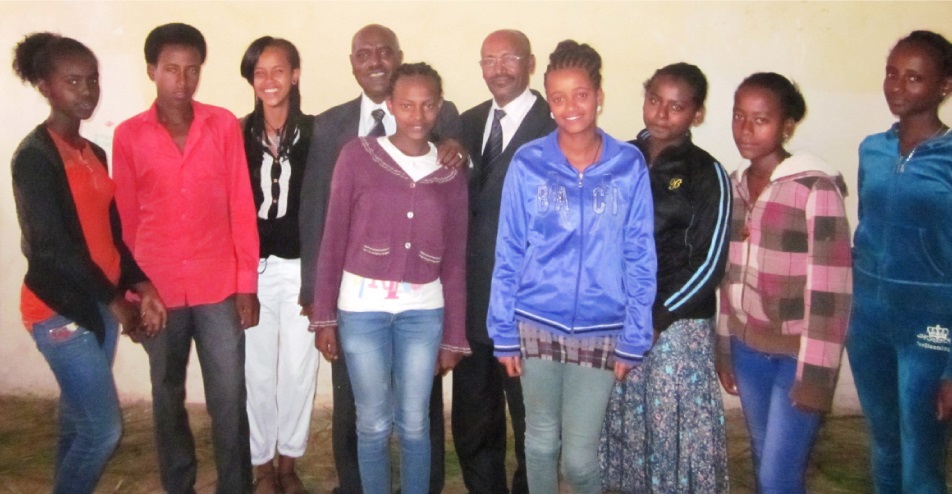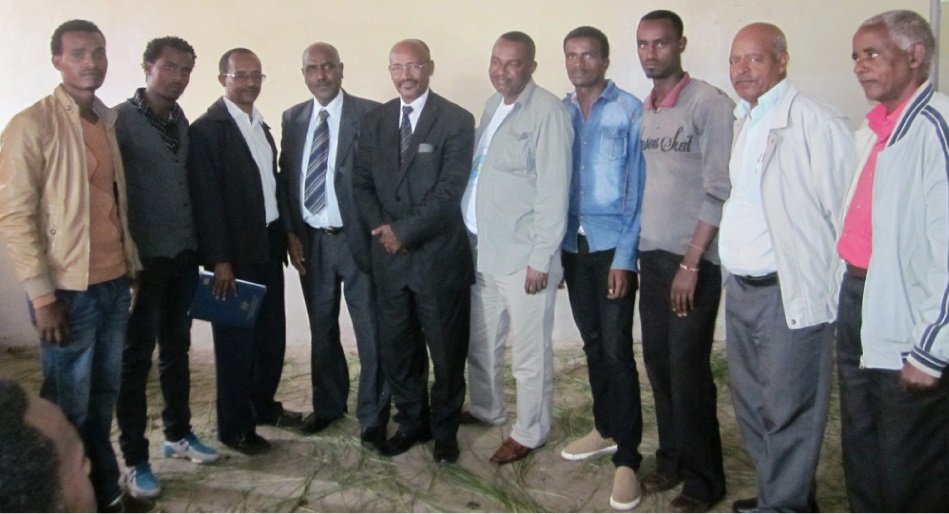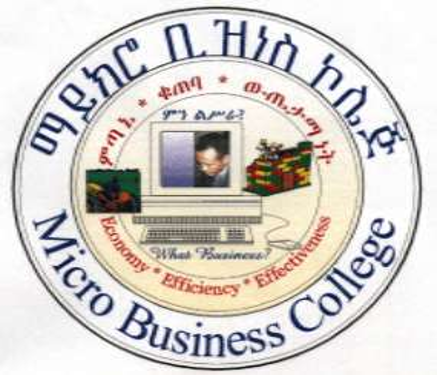
Abera Tilahun is an entrepreneur from Ethiopia and he is the Founder & President of Micro Business College, a privately-owned academic institution that offers programs and general education ranging from pre-primary to high school.
Micro Business College, established in 2001, directly employs 250 people and has on average over 4,000 students per year. It boasts 3 main campuses and 33 distance education centers in Ambo, Gedo and Woliso Towns.
Abera’s educational background has been characterized by Business & Management studies, which initially brought him to an Accountant career and further specialization within the field. Besides his working experience, he also had teaching and research experiences in different universities and colleges in Ethiopia; and from the establishment of Micro Business College, he plays the role of President and Instructor. With this regard, he decided to participate to the 1st edition of the MBA at St. Mary’s University in Addis Ababa (Ethiopia) to refine and improve the management of his own business.
“E4Impact MBA program was advertised to attract practitioners of the field for advancing their businesses, and that interested me a lot. For me, it was not an abrupt decision, but rather a long-term ambition of ascertaining whether my professional career was on the right track or not.” explained Abera. “I expected the entire period of the program could create a platform for future improvement. That was indeed the case, which later laid down the staunch ground of my business. Even after completion of the MBA, I keep on making magnificent improvement of the management system and stepping on the vertical and horizontal expansion of the company. With no exaggeration, I can witness that E4Impact MBA program can nurture real impactors”.
But let’s learn more about Abera’s business and his entrepreneurial career.

1.How was your Business Idea born?
Indeed, the approaches for the creation of a business idea and the establishment of business enterprises are many and varied. Mine was societal-targeted right from the beginning mainly to identify and reduce economic and social pain of the society I used to live in, Dire Dewa City – the 2nd commercial city of Ethiopia – in early 1980s.
I initiated the idea of establishing a training department that could provide short-term trainings, since there was evident lack of middle level trained manpower that the public and private organizations could afford to employ. As the training needs increased from time to time, the Training Department was re-registered as “Institute of Business Education”, as a separate enterprise from the main company founded in 1996 – which was the first of its kind in Ethiopia. Furthermore, I knew some young people who were wandering around the city which, if trained, could have served the society. This triggered my mind and that’s how I got the idea of expanding the “Institute of Business Education” and upgraded it to a college level: Micro Business College at Ambo, Gedo and Woliso Towns, was established in 2001. The college aimed at producing middle level trained manpower who could serve the society on sustainable basis and/or could establish and run their own business. The expansion was going to include all levels of education – from tertiary kindergarten to high school and even after degree programs. All educational programs are integrated with development activities, where enterprises serve as centres for practical lessons to all students at all levels. The college I founded has qualified university levels and now it is on the eve to be named as “University of Micro Businesses”.
2.How can your business improve the life of the beneficiaries of your activities?
The real benefit of our activities is that our service offers real value and provides our customers something they truly need. We always know not only our service features, but also the advantages it gives. That means being constantly aware of new trends that affect our product, especially new educational/ training programs which are already integrated to the real world of work through our own development enterprises and cooperative trainings offered by affiliated companies. Our students and trainees learn and benefit more not from classroom lessons, but from what they do during the whole period of their stay at Micro Business College. Given this, our students/trainees come to our college to register for a “course” and go back home with a “job”. For example, Ayele Nekuma, one of our students of the Accounting Department (2001), completed his 3-year program being a cameraman earning substantial amount of income, which he used to finance his tuition fees and living costs; and at the same time he bought shares of a bank from the savings he accumulated during his stay at our college.

3.What has been the main challenge you had to overcome in your entrepreneurial experience?
I had to face several basic challenges and problems since the beginning of my business idea as educator in a new schooling environment. First of all the was the problem of a weak education environment in the Country, in terms of quality and quantity. Citizens were deprived of access to education (less than 2% of high school completers were allowed to join higher education) and pertinent information (texts, references, curricula, etc.), moreover systems and methods of the program were either traditional or lagging behind… While establishing my school, I tried to minimize the effect of the above problems and to raise new horizons of schooling with a complete system, full of knowledge package (information) required for learning process with participatory approach in order to attain quality education.
Another porblem was the Incorrect Government Education Policy on privately owned Education Institutions, that caused a bad situation from 2011 to 2017, in which students (who were previously enrolled to private schools or colleges( were migrated or directed to government facilities. We survived because basically our students were quality demanding ones, and we relied on the substantial amount of the college income used to be generated from various business enterprises that provided practical lessons to the students and trainees.
Last but not least there was the issue of “Unfair Trading” among schools that encompassed such bad activities committed by existing or newly entrants in the education industry with deceptive pricing, non-compliance of the Ethiopian education standards, shortening graduation period and issuing false certification of training completion, etc. in order to maximize unlawful income. It has been the strong belief and stand of my leadership to condemn “Unfair Trading” and ally with those fighting it, that helped minimize its effect in education. This was one of the contributions we made, that was also witnessed by the public which define our college as a “quality house”.

4.In your opinion, what are the main qualities an entrepreneur should have?
In my view, the essential qualities of an entrepreneur fall into 3 major elements known as the “3Ps”: Passionate, Perseverance and Patience. All these are necessities of a business to come into being, sustain and grow. And these qualities live in the blood of the entrepreneur and make the lifeline of business – I call it the “Human Capital”.
So, I can state with boldness that before stepping onto the floors of business, an entrepreneur should become first a human being of abilities. This relates to the Human Capital, which is acquired through intensive trainings, education, experiences & shaping of behavioral and attitudinal changes!
5.Is there a person you are inspired by, i.e. an entrepreneur or a particular mentor?
Yes. I’m fortunate enough to have been supported and encouraged by many teachers, friends and family members ever since my school life, that ranges from childhood (church school) to universities as student, and from the staff members of some government universities as lecturer and researcher for 12 years. They motivated me to start my own business as an independent consultant and educator.
6.What would you suggest to a new-born entrepreneur?
A new-born entrepreneur is a person who is on the “Startup of Business”. That’s the reason why I believe he or she, more than anyone else, needs to stick to the essential qualities of being passionate, perseverant and patient.

7.Could you tell us a particular satisfactory moment you had in your entrepreneurial activity?
As “entrepreneur” I had no particular satisfactory moment, but my entire lifetime that is full of joy and pride, it is rated more than being satisfied. I can boldly declare that “entrepreneurship” opens the door to the real world of work – the plain land of staying and living for others. What else can give you lasting happiness other than this?
8.Could you tell us how the MBA has helped you and your business?
The E4Impact Global MBA in Impact Entrepreneurship is not simply an academic MBA program, but a special program that incubates impactors. It is a highly relevant program in the context of the rising Ethiopian economy. It makes life of businesspeople easier and empowers them to be productive and profitable.
In my case, I found the program enhancing my business management philosophy that I call the “3Es”: Economy, Efficiency and Effectiveness. The theoretical and practical lessons I gained from the program were instrumental to each of these three elements of the philosophy.
The first two elements – Economy and Efficiency – are tools which can optimize opportunities “within the box”. For example, “Economy” implies the economical operations where there is no wastage of resources, including avoiding an idle time. “Efficiency” entails that the minimum input (resource) is deployed for maximum output. The last element – Effectiveness – represents the maximum effort of the management and staff exerted to maximize the productivity and profitability of the company. In other words, it is the attainment of the desired goal or the successful implementation of the plan. This plan-control cycle of managerial functions was made simple and updated especially by the practical lessons I gained from the Professors of the MBA program.
Learn more on Micro Business College
www.microbusinesscollege.edu.et

